CEO MESSAGE
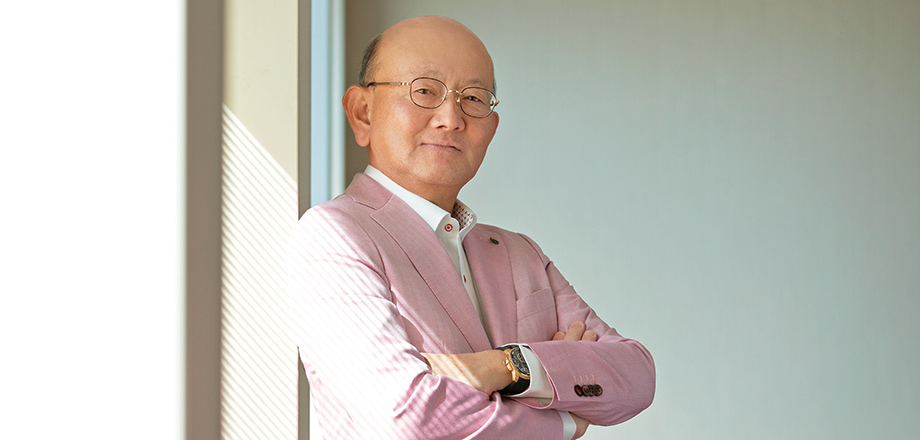
ITOCHU will never be perturbed by major waves of change. Through realizing “a new vision of what a trading company can achieve,” we will confront and firmly catch the waves to transform changes into opportunities for further growth.
Amid a business environment undergoing tumultuous change, in FYE 2019 we continued working steadfastly to turn words into accomplishments. We made steady advances, substantially exceeding the initial targets of a plan to guide the Company toward record-high profits. In FYE 2020, the second year for the medium-term management plan “Brand-new Deal 2020,” we will firm up our profitability, which has now reached the ¥500.0 billion level. We will underscore this level of our true ability by thoroughly enacting our business fundamentals: to “earn, cut, prevent.” Additionally, by accelerating our efforts to realize “a new vision of what a trading company can achieve,” we will transform unprecedented changes into major business opportunities.

Masahiro Okafuji
Chairman & Chief Executive Officer
The Disappearing Home Electronics Retailer
As I was gazing out the car window one day, I noticed a change. I was passing under the elevated railroad of Tokyo’s Shimbashi district when I noted that a symbolic home electronics retailer previously located at a convenient site had disappeared; the site had been taken over by a drugstore. This scene—the sort you see every day—dredged up a memory that had lain hidden in a corner of my mind for almost half a century.
When I joined ITOCHU in 1974, I was assigned to an operating section in Osaka that was in charge of importing and selling woolen cloth for men’s suits, mainly from the United Kingdom. At that time, once almost every week I would board the first flight of the day to Tokyo’s Haneda Airport. I would visit clothing wholesalers in the Kanda district, walking around and selling woolen cloth. It was the heyday of tailored men’s suits, and the wholesalers that supplied cloth to tailors were thriving. However, the advent of ready-made suits caused the popularity of tailored suits to fall, forcing many wholesalers to shutter their businesses. By contrast, across the Kanda River in Akihabara, home electronics retailers were an emerging force and seemed to be springing up everywhere. Now, I felt like I was witnessing the law of natural selection, as the scene I saw from the car window overlapped with the scene from my memory.
I am convinced that humankind can preserve ecosystems, including species in danger of extinction, by putting forth our best effort and working together. Meanwhile, turning back the tide of natural selection in “industrial ecosystems” is no easy task. As companies must meet society’s demands in order to survive, some companies continue to thrive while others become “endangered species.” The changing tenant in one corner of a building seemed a sign of ongoing and impossible-to-resist changes in the “industrial ecosystem.” It goes without saying that general trading companies are right at the center of the changing times. This scene, unrolling before my eyes, underscored how essential it is that we keep evolving.
Having taken up the reins of management as CEO of ITOCHU, there is one point in particular I would like to emphasize: we stand firmly behind the promises we make to shareholders and investors.
No Answers to Be Found in the Meeting Room
Nowadays, when I attend meetings I ask presenters to provide attendees with a clear overview of the subject rather than just reciting materials that only focus on detailed figures and formatting. With Italian suits, for instance, sometimes the buttons might come off or the lining might show, but at a glance you identify the suits as Italian. They exude an aura of luxury altogether different from Japanese suits. By contrast, Japanese suits tend to be very well made. The individual parts may be sewn carefully, but they do not give off that same aura. The same goes for expanding our business going forward. To continue evolving amid a rapidly changing “industrial ecosystem,” we need to quickly discern the signs of major overall changes rather than considering the intricate details of individual circumstances. Making the transition toward acting quickly is key.
Books and news reports cannot provide us with answers about major changes. Rather, we have to use our own five senses. Management should take the lead and spend time thinking and acting, instead of spending time in meetings. For example, every April we hold a Special Headquarters Management Committee meeting, where we set the management plan for the fiscal year. Ten years ago, the documentation for this meeting ran to around 500 pages. We have gradually whittled this number down to just a fifth, or around 100 pages. We also shortened the meeting from three days to one. We have not just reduced the content; rather, we have made the meeting more intense. We refine the agenda prior to the meeting and ensure ample exchange of opinions ahead of time so the meeting itself can serve as a venue for confirming deliberation details. In the past, discussions continued even after the meeting, and sometimes the lead-up to execution took as much as half a year. Nowadays, we start acting right after the meeting ends. Instead of simply accepting the status quo, we continue to press forward. We are also working toward “a new vision of what a trading company can achieve,” undertaking the initiatives outlined in our medium-term management plan, “Brand-new Deal 2020.”
Turning Words into Accomplishments
Each year, in the week after our General Meeting of Shareholders in June, I go to Otani Honbyo in Kyoto to visit the graves of Chubei Itoh I and II, where I make an annual management report. In FYE 2019, the first year of “Brand-new Deal 2020,” we immediately reached the ¥500.0 billion level to report consolidated net profit of ¥500.5 billion. We set new records for our cash-generating power and key financial indicators. Our untiring efforts to boost profitability and improve our financial position paid off, as the four main credit rating agencies all upgraded our ratings during the year from 2017 to 2018. In FYE 1999, we swept away our “negative legacy,” and as a result Moody’s downgraded our rating to Ba, below investment grade. The agency has now brought us back to an A rating for the first time in about 20 years. (→CFO Interview) I believe management’s mindset should focus on always preparing for bad scenarios, moving ahead in good times, and keeping management lean. I think our employees have taken this message to heart, which has led to our positive operating performance.
Having taken up the reins of management as CEO of ITOCHU, there is one point in particular I would like to emphasize: we stand firmly behind the promises we make to shareholders and investors. For FYE 2019, our initial plan called for consolidated net profit of ¥450.0 billion. During the year, we raised that target to ¥500.0 billion, which we met. In the nine years since I was appointed CEO, I have seen many companies repeat the cycle of meeting their initial targets sometimes and not reaching them in other years. Meanwhile, we have met our initial targets every year, with the exception of FYE 2016, when we strategically streamlined our assets and reevaluated them conservatively to set the stage for solid future growth. Setting medium- and long-term targets is certainly important, but those objectives are pointless if they are not met. I also think not meeting targets means being irresponsible toward shareholders and investors. I believe we should commend ourselves for our attitude on upholding the principles of “earn, cut, prevent,” the true value of our highly robust earnings base that withstands economic fluctuations, and our focus on “turning words into accomplishments.”
ITOCHU places a high value on dialogue with shareholders and investors, and we do our best to reflect the opinions we receive into our management decisions. Last October, we announced our Medium- to Long-Term Shareholder Returns Policy in order to reflect the market’s reaction to “Brand-new Deal 2020,” which we had unveiled in May 2018. I believe that our stance that meeting initial targets is mandatory will build trust among shareholders and investors toward our results. As a result, this should make it possible for management to adopt a long-term perspective. Other general trading companies reported record-high share prices during the resource boom of 2007–2008 but have not reached those levels since. We have set new records some four times since the end of the resource boom. I see this as evidence of the market’s trust in our management.
For FYE 2020, our plan calls for consolidated net profit of ¥500.0 billion, the same level as in FYE 2019. Rather than aiming for profit to continue increasing every year, I think it is important to intentionally create plateaus. Cases in which companies set ambitious targets when times are good but then crash into the wall of reality and fail to reach those goals are too numerous to mention. After reaching consolidated net profit of around the ¥300.0 billion level in FYE 2012, we remained at around that level until FYE 2016 as we fortified the business to entrench this level of profit. This move underpinned our ability to achieve strong growth during the three years from FYE 2017. In FYE 2020, first we will ensure that we have the wherewithal to consistently generate consolidated net profit of around ¥500.0 billion. We will then ready ourselves for the next stage of growth. (→FYE 2020 Management Plan)![]()
From the outside, FYE 2019 might have appeared as a year of smooth sailing. However, the outlook is not sunny. I am rather feeling uneasy, as I have a sense of impending crisis.
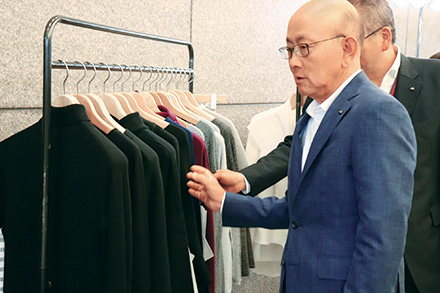
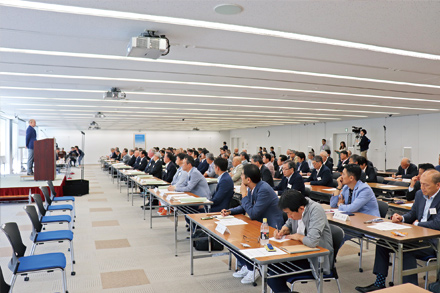
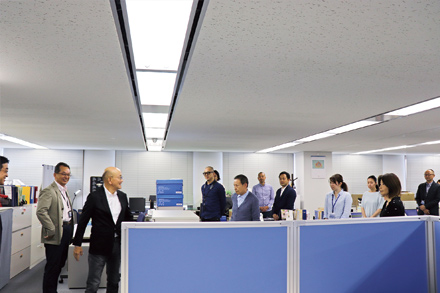
Lessons Learned from the Fate of the Huge Battleships
In World War II, Japan failed to grasp that the days of the huge battleships they had relied on for success in the past were giving way to an era when air power conferred superiority. I see some disturbing parallels between that time and the current business environment. Take for example the case of chemicals manufacturers that produce plastic straws. If demand for plastic straws gives way to those made of paper, the manufacturers will suddenly note that times are changing when their sales decline. Similarly, if sales of electric vehicles (EVs) rise at the expense of gasoline-powered vehicles, automakers will quickly feel the impact of the changing market. On the other hand, the situation is somewhat different for ITOCHU, being a general trading company with its strength in the consumer-related business. Although sales routes may shift from department stores to the Internet, the items we handle (such as food products and apparel) change relatively little. For this reason, I am concerned that we may be caught unawares by major market changes. One of Japan’s leading automakers is forging an alliance with a major IT company, responding to the automotive market’s shift in emphasis “from ownership to use” by entering the mobility services business. We also need to recognize that the time when companies survived by holding on to their existing business model has ended. Our subsidiary, FamilyMart Co., Ltd., is no exception. With nearly 60,000 convenience stores in Japan, the industry is saturated. While stores are competing for sales territory, drugstores and new companies armed with leading-edge technologies are coming in from “above” and encroaching on their territory. In the near future, mobile convenience stores will undoubtedly begin posing a threat, as well. The moment we stop moving, we will share the fate of the huge battleships in their last days.
The ITOCHU Group is currently in the throes of what has been dubbed the Fourth Industrial Revolution. Going forward, in addition to handling products and services involving new technologies and materials, we will utilize these products and services to upgrade our existing business. Furthermore, we aim to change the game in a way that will significantly alter the traditional industrial order and structure. In other words, rather than fearing we will be swallowed up by the waves of change, we intend to ride the waves skillfully to enter fields we could never have even dreamed about in the past. There is a chance for us to take the initiative on a larger scale. (→Aiming to Reinvent Our Business)
To achieve this ambition, we aim to realize “a new vision of what a trading company can achieve.” Now I would like to talk about this vision, which I can see clearly taking shape.
Success of HOKEN NO MADOGUCHI GROUP and a Market-Oriented Perspective
In the past, it was typical for insurance salespeople to visit corporate offices and build personal relationships by chatting and leaving behind brochures and sweets. Once it became common practice to bar people from outside from entering corporate offices, sales approaches changed. Rather than visiting prospective clients to offer products they were trying to sell, salespeople began adopting the more neutral approach of introducing potential customers to products meeting their needs. The industry’s frontrunner in taking this new approach to relationship-building is HOKEN NO MADOGUCHI GROUP, in which ITOCHU is the largest shareholder. This is just one example of the change. As traditional companies are changing at a rapid pace, we have started to expand businesses involving companies we had no chance to collaborate with in the past in many fields. To ride these waves of change, we must create an altogether “new vision of what a trading company can achieve.” I can clearly see the direction of this evolution.
One feature that HOKEN NO MADOGUCHI GROUP and other new industry leaders share is their ability to hold onto customer contact points. To achieve this, we need to make the major shift from product-dependent sales to a more consumer-focused approach—a “market-oriented perspective,” in other words. This is our first theme for realizing “the new vision of what a trading company can achieve.” I think we are uniquely positioned to make this vision a reality, thanks to our strength in the consumer-related business. Our key platforms include those who have customer contacts such as FamilyMart Co., Ltd.; YANASE & CO., LTD., which sells luxury imported cars mainly to wealthy individuals; and ITOCHU ENEX CO., LTD., which engages in a comprehensive range of businesses, from the operation of some 1,800 stores throughout Japan catering to motorists’ needs to the sale of petroleum products, LPG, and electricity.
Specifically, we can take advantage of the scale of FamilyMart’s store network on several fronts, including logistics, product development, and procurement. We also expect the network to be a major source of data, which should be a valuable asset going forward. This is our second theme for realizing “a new vision of what a trading company can achieve.”
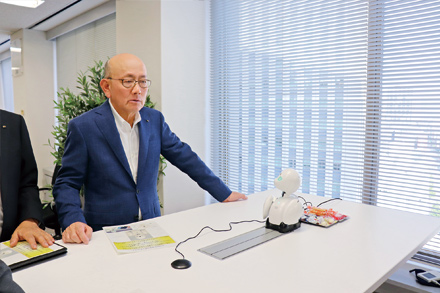
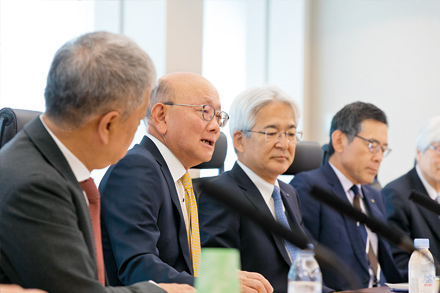
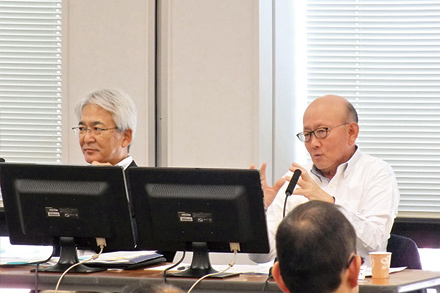
A Fine Line between Winners and Losers
One day during Japan’s May holidays, I bicycled from my lodging in Karuizawa with the idea of buying at another convenience chain a product I typically purchase at FamilyMart. You often hear people say things like “such-and-such convenience store sells the best rice balls and lunch boxes” or “that convenience store does the best sweets,” and certainly, each of those offerings is delicious. However, some offerings are hard to distinguish from FamilyMart’s, while FamilyMart’s are sometimes even better. It occurred to me that if I closed my eyes while eating I might not even be able to tell the difference. Rather than the differences in taste being touted, there seemed to me there was only a fine line distinguishing the offerings. Differentiators include factors such as how to serve up salads, attractively balance colors, and package snacks and processed foods in ways that encourage shoppers to pick them up. Such details affect how many consumers select products. It seems to me that many of the items Japanese companies produce differ little in terms of function and performance, and the differences between products that sell and those that do not are tiny. To remain among the “winners,” it will be extremely important for the ITOCHU Group to use data obtained through customer contacts at FamilyMart and other Group companies to determine the fine distinctions that consumers call for. Leveraging customer data will make it possible to provide products and services carefully tailored to individual trade areas. Such data also makes it possible to endlessly expand our business potential in financial services and other peripheral businesses and to optimize the entire value chain. To expand our business in this manner, we will need to address some of the issues associated with being a “general” trading company.
Breaking Down Vertical Organizations
General trading companies typically try to expand their business along product lines. ITOCHU, for example, separates business among Division Companies by product type—foods and textiles, for example. These Division Companies’ operations break down further into more finely detailed organizations by product and service. Within frameworks for closely related products, these organizations are optimized to procure and sell individual products and provide individual services. At times, however, vertical organizational structures can have negative effects. For example, responding to a query about overall supermarket selling areas can be difficult when people are in charge of specific product areas, such as meats, coffee, or snacks. Under the current vertical structure, responding to comprehensive demands including various products and services is difficult. With growing frequency, even traditional companies are transforming beyond industry boundaries, and Division Companies have found it difficult to respond on their own to these demands. We also have to consider how to expand businesses with those of rapidly growing e-commerce companies. E-commerce companies can closely analyze masses of data about consumer preferences and offer products that meet specific customer requirements, thereby expanding overall trading volume rather than the sales of individual products. In this manner, in addition to our conventional product-specific expertise, various companies are calling for us to provide functions that we are uniquely able to offer and provide one-stop services. We recognize that expanding business in a multifaceted manner rather than in individual fields requires us to adopt a market-oriented perspective and provide an organization that accurately meets customer needs. To achieve this goal, we must change our vertically oriented culture and organization. This is our third theme for realizing “a new vision of what a trading company can achieve.”
As the first step, on July 1, 2019, we established The 8th Company. The new Division Company brings together some 40 specialists in B-to-C business from the seven existing Division Companies, as well as related assets. By adopting a market-oriented perspective at the new Division Company, we aim to accumulate successes by leveraging our customer base. Going forward, we plan to expand this model to the seven existing Division Companies, as well. The 8th Company will serve as the vanguard of our Companywide transformation to a market-oriented perspective. However, as trees cannot thrive if they are transplanted frequently before they properly take root, cultivating professionals in specific areas requires that they spend a certain amount of time in that area. This policy will not change. In The 8th Company, we will cultivate marketing professionals. When formulating “a new vision of what a trading company can achieve,” we will also review our human resource strategy. We plan to actively move personnel throughout different organizations once they have “taken root,” leading to the breakdown of the vertically oriented mindset. We will respond to an increasingly flexible labor market and rapid progress in information technologies by introducing personnel systems that motivate employees and encourage their growth, such as by promoting young and highly capable employees across organizations. (→Establishment of The 8th Company)![]()
To date, ITOCHU’s recruiting efforts have concentrated on candidates who have a strong sense of passion and superior communication skills. The coming era will require people who have business sense. To this end, I think we need to begin hiring people with an artistic bent that can be directed toward innovation or have skills in specific areas, even if their social skills may be less well developed. The female perspective is becoming an ever more important part of our business, so we need to be more proactive in hiring women. In this spirit, we have increased the number of female outside Directors from one to two. We have also increased from one to two the number of female Executive Officers, promoting a female employee who has been at ITOCHU for her entire career.(→History of the Board of Directors)
Our founder believed in doing what was good for society. In that same spirit, we recognize that resolving social issues helps achieve sustainable increases in our corporate value. This is the final aspect of “our target vision of what a trading company can achieve.”
The Tokyo Disney Resort’s Commitment
The Tokyo Disney Resort’s commitment to cleanliness is legendary. The resort expresses its standard simply as “being clean enough for a baby to crawl around,” leaving the details of how to achieve this to individual employees. Actually, ITOCHU’s corporate message, “I am One with Infinite Missions,” incorporates a similar idea. It expresses our determination simply, stating that our employees engage in business with a proactive sense of mission, considering for themselves what the Company can provide to society and then doing so. Through this process, I am convinced that we will continue to make ITOCHU itself more sustainable. This message originates in sampo yoshi (good for the seller, good for the buyer, and good for society), the management philosophy of Chubei Itoh I and the merchants of Ohmi. “Good for society” expresses the concept that if we wish to continue our business, we must continue to provide value to society. I am proud that our founder had this as one of his philosophies of business 160 years ago. That philosophy is still valued today.
Society currently faces a host of problems, including climate change and poverty, which I believe is significant as those can affect our business model. For instance, calls for limits on the use of plastic products and moves toward a carbon-free society are prompting us to handle plastic alternatives and build cellulose fiber plants. We have also announced our policy on the coal-fired power generation and thermal coal mining businesses. When we address these social issues, we also need to increase profits while taking steady steps to alleviate issues. This approach enables the Company itself to sustainably increase corporate value. Meanwhile, we need to simultaneously consider the environment and society. I believe a number of issues will be resolved as a matter of course as we expand our viewpoint from a customer-focused, market-oriented perspective to a society-wide perspective, remain keenly attuned to society’s issues, and provide solutions optimized to the needs of individual countries and regions. I believe this approach is in line with the philosophy behind the Sustainable Development Goals (SDGs). In keeping with the “good for society” focus of our founder, we address social issues that will help us enhance our corporate value sustainably. This is the final aspect of “our target vision of what a trading company can achieve.” (→Sustainability)
Good for Employees
ITOCHU has taken the lead among Japanese companies in a variety of workplace initiatives, such as the morning-focused working system. In FYE 2019, we earned plaudits in a variety of popular workplace rankings. In surveys conducted by seven major research organizations, three ranked us the top company overall, and six put us at No. 1 among general trading companies. I see these results as evidence that even students are aware of our approach toward consistently taking on new challenges on the working-style front. As I have repeatedly stated, such measures are part of our management strategy. For instance, our “Dress-down Days” encourages employees to think about how to coordinate their clothing each Wednesday and Friday. The policy promotes “a new vision of what a trading company can achieve” by cultivating sense of flexibility and an eye for coordination in business, as well. In recent times, I have become increasingly aware of what is “good for employees.” I am convinced that receiving high marks from society helps employees work with a sense of pride and gives their families a sense of pride in the Company, as well, fostering its sustainable development. We handle more work per employee than any other general trading company, so it is a matter of course that we treat employees like family. Our Support Measures for Balancing Cancer Care and Work reflects my perspective. We have received a great deal of support and empathy for the fundamental concept: prevent employees from contracting cancer, don’t let employees lose hope if they contract cancer, and ensure that they always have a place at ITOCHU that is protected by all. In performance evaluations for employees, we have introduced a new system that sets targets for employees who have been diagnosed with cancer on balancing treatment and work. Confronting cancer as a target to be reached and bringing together the best capabilities to fight disease is clearly the best approach for employees and the Company alike. We are fostering a family-like atmosphere in which employees feel free to say, “Today I need to take some time off for treatment.” I think such an atmosphere shows a company’s true strength. (→ Human Resources)![]()
Looking Back on Our Merchant Origins
This year, as I stood in front of the grave of our founder, I reported that the efforts of all Group employees had made it possible for us to secure our top-class place in the industry on the financial front, as well as in profit terms. My reason to visit the grave each year is rooted in the desire to remain aware of our merchant origins, regardless how high our industry position may be. The business environment is changing at an unprecedented pace, but I am not bothered. We will remain true to our merchant principles of “earn, cut, prevent.” At the same time, we will maintain a sense of humility and focus, as Chubei Itoh I did, as we work to provide what is required to the right person and in the right manner.
Chubei Itoh I shouldered his carrying pole and began peddling linen in 1858, at the age of 15. Now, 161 years later, we hark back to those merchant origins, carrying forth this DNA as we embark on new challenges. Rather than being swallowed up by the large waves in front of it, ITOCHU will catch the waves and transform changes into business opportunities.
